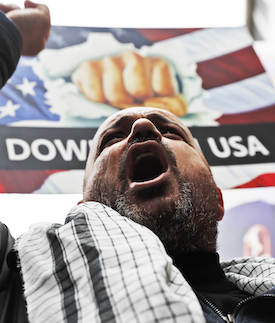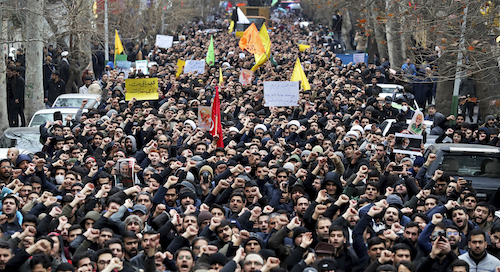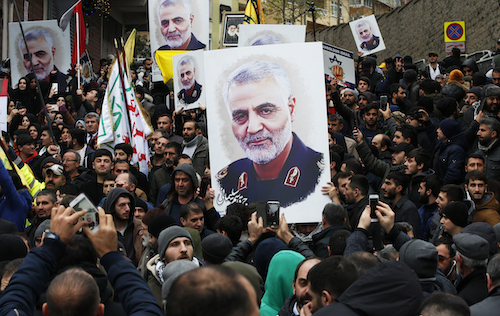The amerikkkans are only interested in war, theft , and plundering of other nations, usually made weak by their sanctions. Then, like the heroes they are, they will bomb schools, hospitals , villages , and the occasional wedding party.
Fuck u.s. imperialism.
With a state funeral level ceremony, Iranian President Hassan Rouhani and Supreme Leader Ayatollah Ali Khamenei conducted Islamic prayer rites over the late general’s remains.
Fearing the worst, most world leaders called for de-escalation and dialogue. European-U.S. relations are already strained with Mr. Trump acting alone on important geopolitical issues. The assassination left European allies thinking about the safety of their own troops in the Middle East. Some complained once again they weren’t given any warning before the deadly strike at Baghdad’s airport.
“The U.S. is Israel’s proxy. Trump is giving (Prime Minister Benjamin) Netanyahu what he wants,” Dr. Leon asserted. “He’s behind the scenes making all the noise. He thinks war will then position Israel to run roughshod over the region. We also have to see what role Saudi Arabia plays in this. Fragile monarchies and governments could fall if this thing expands into a regional conflict. The House of Saud and Bahrain are at risk. When the dust settles, these monarchies and governments could go the way of the Ottoman Empire.”
Fuck u.s. imperialism.
Marching Toward War? Anger, resentment, danger rise
BY BARRINGTON SALMON AND BRIAN MUHAMMAD THE FINAL CALL @THEFINALCALL | LAST UPDATED: JAN 7, 2020 - 12:36:13 PM
Hundreds of thousands of Iranians turned out in the streets mourning the killing of Qassem Soleimani in early January. Thousands more did the same in other parts of the Middle East. The crowds were so large in Iran the coffin carrying the remains of the national hero was delayed several times in moving to different parts of the country. Finally, the casket arrived in his home village for burial.

Protesters chant anti-U.S. slogans during a demonstration against the killing of Iranian Revolutionary Guard Gen. Qassem Soleimani, close to the United States consulate in Istanbul, Jan. 5.
|
Meanwhile, the U.S. assassination Gen. Soleimani on Iraqi soil was met with condemnation from Iraq’s foreign ministry and Prime Minister Adel Abdul Mahdi, who called the drone strike a violation of national sovereignty.
“What happened was a political assassination,” Mr. Mahdi said. “Iraq cannot accept this.”
Mr. Mahdi said Gen. Soleimani was in Baghdad to meet with him about a Saudi request for dialogue to relieve tensions in the region—not, as the U.S. has claimed, to plan attacks against Americans.
Iraq’s parliament voted Jan. 5 to expel all American troops and file a United Nations complaint against the U.S. for violating Iraq’s sovereignty with the assassination. U.S. soldiers have been stationed across bases in Iraq since an invitation by the Iraqi government in 2014 to support the Iraqi military against ISIS forces. Now, fear is a U.S. withdrawal could mean an ISIS revival and greater destabilization in the Middle East.
Media reports said only 173 of the 329 Iraqi Members of Parliament were in attendance. The measure was backed by most Shiite members of Parliament, who hold a majority of seats. Many Sunni and Kurdish legislators were absent, indicating a divide over the proposal.
President Trump responded by threatening massive sanctions on Iraq, including demands Iraq repay America for some military costs. He has also directed thousands more U.S. troops into the region.
If Iran retaliates, America has targeted 52 Iranian sites, including cultural sites, for destruction, the U.S. president declared. The sites represent “52 American hostages taken by Iran” during the 1979 Islamic Revolution that overthrew the U.S.-backed puppet regime of Mohammad Reza Pahlavi, the Shah of Iran, tweeted Mr. Trump.
Critics and Iranians called his threat reckless and the destruction of cultural monuments a war crime. Iran’s information and telecommunications minister, Mohammad Javad Azari-Jahromi, denounced Mr. Trump as “a terrorist in a suit.”
“Like ISIS, Like Hitler, Like Genghis!” Mr. Jahromi said on Twitter. “They all hate cultures. Trump is a terrorist in a suit. He will learn history very soon that NOBODY can defeat ‘the Great Iranian Nation & Culture.’ ”

Protesters demonstrate over the U.S. airstrike in Iraq that killed Iranian Revolutionary Guard Gen. Qassem Soleimani in Tehran, Iran, Jan. 4. Photo: AP Photo/Ebrahim Noroozi
|
Fearing the worst, most world leaders called for de-escalation and dialogue. European-U.S. relations are already strained with Mr. Trump acting alone on important geopolitical issues. The assassination left European allies thinking about the safety of their own troops in the Middle East. Some complained once again they weren’t given any warning before the deadly strike at Baghdad’s airport.
In a Jan. 6 briefing with reporters, UN Secretary-General Antonio Guterres warned of miscalculations with global tensions “at their highest level this century.”
These tensions are “leading more and more countries to take unpredicted decisions with unpredictable consequences,” he said.
“Stop escalation. Exercise maximum restraint. Re-start dialogue. Renew international cooperation,” urged Mr. Guterres.
‘Reckless, foolish and unnecessary’
The assassination sparked fears a vast, unpredictable conflict could flare up in Saudi Arabia, Bahrain, Yemen or elsewhere. A possible early casualty was a young Black servicemen from Hazel Crest, Ill., 23-year-old Army Spc. Henry Mayfield Jr., who died in a Jan. 5 attack by Al-Shabaab targeting Americans in Kenya.
“Are we going to have war? I don’t know but it means that we’re much closer than we should be,” said political scientist, author and talk show host Dr. Wilmer Leon, III. “What Trump did was reckless, foolish and unnecessary. There is no endgame. There is no win here. If Trump thinks that this win results in regime change, he doesn’t know his history.”
“Imposing sanctions on a country doesn’t work. Pressure, for the most part, creates a sense of nationalism and allows the government to say, ‘You see what the U.S. is doing?’ Assassinating a beloved general does the same thing. The U.S. has empowered the radicals and weakened moderates” (in Iran).

Protesters gather during a demonstration against the killing of Iranian Revolutionary Guard Gen. Qas- sem Soleimani, close to the United States consulate in Istanbul, Jan. 5. Protests also erupted in Iran in the aftermath of the killing.
|
“The U.S. is Israel’s proxy. Trump is giving (Prime Minister Benjamin) Netanyahu what he wants,” Dr. Leon asserted. “He’s behind the scenes making all the noise. He thinks war will then position Israel to run roughshod over the region. We also have to see what role Saudi Arabia plays in this. Fragile monarchies and governments could fall if this thing expands into a regional conflict. The House of Saud and Bahrain are at risk. When the dust settles, these monarchies and governments could go the way of the Ottoman Empire.”
Dr. Leon continued, “It’s not American troops or facilities being attacked but also oil. All of a sudden, you can stay there for the next 55 years protecting Standard Oil. The problem is, no one really comments on that and asks what that means.”
President Trump told reporters Jan. 3 he ordered Gen. Soleimani killed to prevent future attacks on Americans.
Democratic presidential candidate Joe Biden said President Trump “tossed a stick of dynamite into a tinderbox.” Michael Morell, former acting and deputy CIA director and CBS News senior national security contributor, told “CBS This Morning” the drone strike on Gen. Soleimani will lead to “dead Americans, dead civilian Americans.”
The Trump administration was still on the offensive, with reports of air strikes on Iraqi militia members and questions about where else the U.S. might hit.
John Bolton, Mr. Trump’s former national security adviser, who has long sought the overthrow of the Iranian government, exulted over the assassination. He tweeted his “congratulations to all involved in eliminating” Iran’s top general. He added hope “this is the first step to regime change in Tehran.”
Demands for peace amid ‘de facto’ war
“Everyone recognizes that this is a dangerous escalation. The assassination was, in essence, an act of war that could spin out of control,” warned anti-war and social justice activist Ajamu Baraka, an associate fellow of the Institute for Policy Studies and former 2016 vice-presidential nominee for the Green Party. “The question is what does this all mean? A de facto war is already going on. What happens next depends on what Iran does, how it responds and then the U.S. response. This is a formula for the inevitable escalation and conflict.”
Mr. Baraka, national organizer of the Black Alliance for Peace, thinks Iran will be cautious while the U.S. is creating scenarios and conditions for a massive assault.
“The U.S. will not put troops on the ground, but they have an enormous capacity to inflict damage on Iran’s economic and civilian infrastructure,” said Mr. Baraka, an editor and contributing columnist for the Black Agenda Report and a writer for Counterpunch.
Americans should not expect establishment Democrats to confront or hold President Trump accountable for his actions or steer the country away from the brink of war. That responsibility falls on ordinary Americans and the anti-imperialist, anti-war movement which “is still recovering from the demobilization that occurred under Barack Obama and was sidelined thereafter,” said Mr. Baraka.
“U.S. imperialist policies have been accepted and become the norm,” said Mr. Baraka, founding executive director of U.S. Human Rights Network. “This situation has proven to be an opportunity for our movement to recapture anti-war Black people and those opposed to the global lawlessness of America. Republicans and Democrats are united in expanding the U.S. global presence and hegemony. Democrats aren’t willing to countermand the laws. There’s no force out there able to stop the U.S. from acting as rogues.”
He told The Final Call he expects the anti-war position to get attention and expects the U.S. to bomb Iran in the coming weeks. Thousands turned out in U.S. cities for Jan. 4 anti-war protests. It was an impressive outpouring in a short time, said protest organizers. (See story page 4)
A Common Dreams story authored by staff writer Eoin Higgins reported that MoveOn, a liberal advocacy group launched a petition asking Congress to halt the march to war.
Progressives like Rep. Alexandria Ocasio-Cortez (D-N.Y.) demanded congressional action to rein in the administration after the air strike, while calling for restraint and a return to diplomacy.
“Right now is the moment to decide if you are pro-peace or not,” Ms. Ocasio-Cortez tweeted. “Congress now has a moral and legal obligation to reassert its power to stop this war and protect innocent people from horrific consequences.”
“We must reject retribution and military action towards all-out war that endangers the future of Iranians and Americans alike,” said Uzra Zeya, president and CEO of the Alliance for Peacebuilding. “Peacebuilding—in the form of de-escalation, dialogue, restraint, and diplomacy—is now more important than ever.”
Foreign policy analyst Asha Castleberry, an adjunct professor at George Washington University, said the targeting and assassination of such a high-value target surprised her. It had appeared as if Iran-U.S. relations were getting incrementally better until the U.S. imposed “maximum pressure” sanctions that severely harmed Iran’s ability to conduct business globally and provide for its citizens, she said.
“Big picture, we don’t want to be in any more damn wars. Trump miscalculated and shouldn’t be escalating anything with Iran,” said Ms. Castleberry, a U.S. Army veteran who served in Iraq in 2015 and 2016.
“After he scuttled the Iran deal, diplomacy and communications were cut off, which is a big problem. I’m hoping and praying there is no war but what he’s doing is high risk and he gambles a lot of the time. It’s nothing but endless wars which completely wipe out our budgets and takes money away from education, housing, social programs and other needs Americans have.”
Sanctions, threats typify Iran policy under Trump
Aggression and threats from the U.S. since President Trump took office have been accompanied by sanctions that seriously crippled Iran’s ability to conduct business with the U.S. and other countries.
On April 2, 2015, the Obama administration and Germany, Russia, China, France and the United Kingdom signed an agreement that would severely limit Iran’s nuclear programs over 10 years in return for lifting of sanctions. The final agreement, called the Joint Comprehensive Plan of Action, was adopted Oct. 18, 2015. UN sanctions were lifted Jan. 16, 2016. President Trump, a persistent critic of the agreement, announced May 8, 2018 that the U.S. would withdraw from the deal.
Human Rights Watch has detailed pain and suffering caused by the sanctions, including harming Iranian health. Although the U.S. allows exemptions for humanitarian imports, the report noted, broad U.S. actions against Iranian banks, coupled with aggressive rhetoric from U.S. officials have drastically constrained Iran’s ability to finance humanitarian imports.
“The consequences of redoubled U.S. sanctions, whether intentional or not, pose a serious threat to Iranians’ right to health and access to essential medicines—and has almost certainly contributed to documented shortages—ranging from a lack of critical drugs for epilepsy patients to limited chemotherapy medications for Iranians with cancer,” the report said.
“On several occasions, U.S. officials have indicated that the pain U.S. sanctions are causing for ordinary Iranians is intentional, part of a strategy to compel Iranian citizens to demand their autocratic government to ‘change behavior’—a recipe for collective punishment that infringes on Iranians’ economic rights,” the Human Rights Watch report said.
Political analyst and commentator Dr. Avis Jones-DeWeever said Mr. Trump’s decision “is kinda predictable.”
“The unredacted emails came out the same day as the bombing showing that he directly ordered that the military aid money to Ukraine be held up,” she said. “It’s no coincidence that they launched to airstrikes when they did. It’s very cheap way to try to inject ‘the rally round the flag’ effort.”
“He dodged the draft several times. He is a self-confident coward who will do anything to stay in power … this is an act of aggression on the part of America. Wait until people die then that will have an effect,” she said.
Mainstream media is complicit, she said, because its soundbites and messaging reverberate and reflect the strategy of deflection from the evidence that caused President Trump to be impeached in the first place.
“All he thinks about is what he can do for himself today,” Dr. Jones-DeWeever said of Mr. Trump. “He is impulsive and doesn’t look at the consequences and he cannot control the domino effect. It is a ridiculous and short-sighted decision.”
“Now, America is provoking Iran,” said Nation of Islam Minister Louis Farrakhan. And, he continued, “the world is not afraid of America, but our president wants the world to fear him. … America’s about to go to war. And when she goes to war, she wants Black and Brown bodies. Now, you’re useful. They don’t give a doggone about how Black Lives Matter until they want to use Black Lives to accomplish their wicked ends. They’re trying to provoke Iran. I would like to say to the president, Mr. President, it would not be a wise move for you,” he warned. (See page 20 for an article by Min. Farrakhan on this important subject.)
